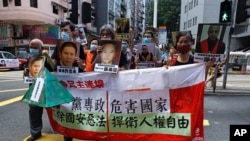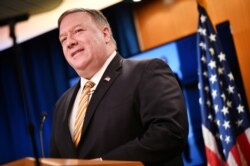The United States is ending exports to Hong Kong of defense equipment and dual-use technologies that originate in the U.S. — as it does for China — citing national security purposes.
Monday’s announcement comes as China moves forward with passing a national security law on Hong Kong.
“The United States is forced to take this action to protect U.S. national security. We can no longer distinguish between the export of controlled items to Hong Kong or to mainland China,” U.S. Secretary of State Mike Pompeo said in a statement.
“We cannot risk these items falling into the hands of the People’s Liberation Army, whose primary purpose is to uphold the dictatorship of the CCP by any means necessary,” the chief U.S. diplomat added.
China’s top law-making body is expected to pass a sweeping national security law for Hong Kong on Tuesday, a move that many critics and ordinary Hong Kong residents fear will empower the Chinese Communist Party (CCP) to tighten its control and threaten the unique status of the freest city on Chinese soil.
In Beijing, Chinese officials said the U.S. actions “are doomed to fail.”
“No matter how rioters and separatists clamor, how external anti-China forces mount pressure, no one can stop China's determination and action to promote national security legislation in Hong Kong,” said Zhao Lijian, a spokesman of China's Foreign Ministry.
The U.S. said its action Monday “is a direct consequence” of China’s decision to further undermine Hong Kong’s autonomy that the Beijing government promised to maintain under the Sino-British Joint Declaration, a U.N.-filed international treaty.
On May 27, Pompeo reported to the U.S. Congress that Hong Kong is “no longer autonomous from China” and “Hong Kong does not continue to warrant treatment under United States laws,” given facts on the ground.
Last Friday, the U.S. announced visa restrictions on current and former Chinese Communist Party officials deemed responsible for, or complicit in, undermining Hong Kong’s high degree of autonomy, or undermining human rights and fundamental freedoms in Hong Kong. Family members of such persons may also be subject to these restrictions.
That action came a day after the U.S. Senate passed the Hong Kong Autonomy Act and threatened to impose sanctions on foreign individuals and entities that materially contribute to China's failure to preserve Hong Kong's autonomy.
The United States is not ruling out “additional measures” to reflect the reality on the ground in Hong Kong.





